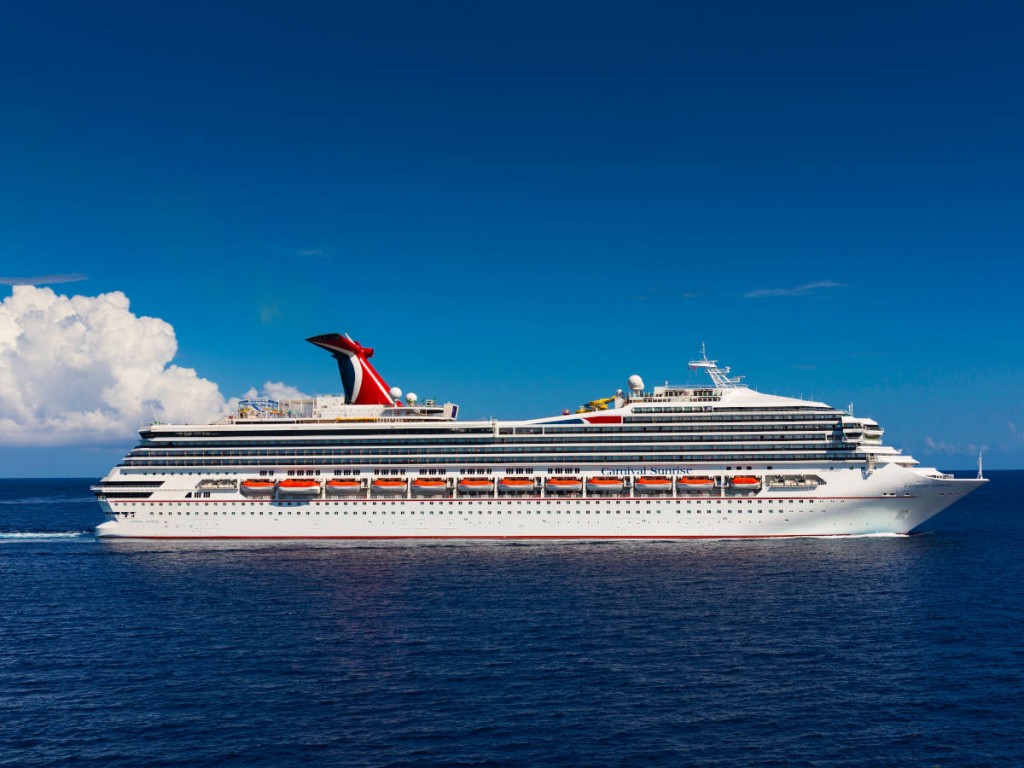Carnival Corporation has offered up to 15 cruise ships to be deployed as possible hospital ships for non-Coronavirus – COVID-19 - hospital patients, according to Roger Frizzell, Carnival’s chief communications officer, based in Miami.
One cruise ship that could be deployed is the Carnival Sunrise [see picture].
The deployments would move non-Coronavirus patients out of hospitals and on to cruise ships repurposed as floating hospitals so as to allow local hospitals to better focus on COVID-19 patients.
Unfortunately, there are, as yet, no immediate floating hospital cruise ship deployments planned, Frizzell said.
Cities and localities are increasingly overwhelmed by the immediate emergencies they face from COVID-19 and are unable to focus on long-term solutions even as the shortage of hospital beds becomes a growing crisis.
Another problem for the cruise ship deployments is to find qualified staff to handle the floating hospitals when the numbers of doctors and nurses are already stretched thin fighting the growing COVID-19 outbreaks around the United States.
Possible Floating Hospital Cruise Ship Ports
Frizzell told AJOT that in the United States: “cruise ships could be immediately deployed to U.S. ports at Los Angeles and Long Beach, New Orleans, Boston, New York,” and Northern California and Florida ports.

Meeting CDC Protocols
A March 26th Centers for Disease Control (CDC) report, “Public Health Responses to COVID-19 Outbreaks on Cruise Ships — Worldwide, February–March 2020” warned about vulnerability of cruise ships to the COVID-19 threat stating: “Cruise ships are often settings for outbreaks of infectious diseases because of their closed environment and contact between travelers from many countries.”
Frizzell said the company is addressing these concerns and is working with CDC officials and “will be able to meet all CDC decontamination requirements for the vessels.”
One example is that cruise ships use shared ventilation systems that, under current conditions, might pose a virus contamination threat to patients on the vessel.
Frizzell said: “We are aware of concerns about shared air ventilation systems on our vessels and we are able to make adjustments to fresh air ventilation so as to eliminate any concerns.”
He said: “We are prepared to make these adjustments that are needed to accommodate hospital patients who are non-COVID-19 exposed and we believe we can make these adjustments fairly quickly”.
Frizzell said that one mitigation for accommodating over 1,000 patients is that each ship has a small hospital facility that can accommodate up to 25 patients.
He said Carnival has been using a CDC recognized decontamination agent to clean its vessels and make them free of contamination.
Carnival is not offering its newest vessels for hospital deployment. The company is offering older vessels with an average passenger carrying capability of 2,000 passengers. However, the actual capacity may need to be adjusted downwards to accommodate hospital patient requirements and social distancing precautions.
Hospital Staffing Concerns for Cruise Ships
One port has been looking at the deployment of Carnival cruise ships but there are concerns about staffing because there are few qualified nurses and doctors that are not focused on COVID 19 patients at hospitals.
So, the question is: where could qualified staff be attracted from to support staffing on the cruise ships?
U.S. And Foreign Interest
Frizzell said: “There have been about a dozen inquiries about using our ships for hospitals. Of these inquiries, three have come from the United States,” meaning that nine inquiries have come from foreign countries.
Pandemic Creates Unanticipated Emergency Services Challenges
AJOT has been told that emergency services responses to the Coronavirus have been slowed by having to respond to conditions that had not been anticipated under conditions where medical supply shortages have placed doctors and nurses at risk.
For example, in California emergency services personnel have been preparing for earthquakes. In that emergency, one of the priorities is to remove debris and expedite food and emergency supplies.
For states along the Gulf and Atlantic Coasts the emergency threats come from hurricanes, storm surges and flooding.
Right now, hospitals, mayors and emergency service personnel are so overwhelmed that focusing on an option that is deemed non-critical is difficult.
In California, the U.S. Army Corps of Engineers is looking at options for back-up hospitals.
New reports say hospitals that become overcrowded with patients are planning to move overflow patients into Recreational Vehicles (RVs), at hospital parking lots, RV parks, sports fields and stadiums.
The attraction of cruise ships may increase as hospital beds fill up and patients are relocated to hallways and parking lots.
The Coronavirus threat has created emergency services challenges that were not anticipated including contamination threats that are difficult to respond to and requiring decontamination measures that could be life threatening for emergency workers.
The combination of these novel challenges, plus the shortages of medical supplies, hospital beds and the limited number of doctors and nurses has placed an exceptional strain on doctors and nurses in which decision making has been a challenge.
Cruise Ships Can Provide Thousands of Additional Hospital Beds & Help Alleviate the Crisis
Governor Gavin Newsom of California, has warned that the State may require a surge capacity of 17,000 hospital beds to meet the COVID-19 threat. Carnival Corporation’s offer of floating hospital beds provided by cruise ships with 2,000 passenger capacity per vessel for non-COVID-19 patients mitigate this impending crisis for California and for coastal communities around the United States.

